May 23, 2018

Whether you’re a patient searching for more information on the use of dental implants versus dentures, or a dentist who places implants but is looking for another easier-to-use, high-quality option for your patients, you need answers.
This in-depth implants-versus-dentures guide will give you a better understanding of your options, including a look at the pros and cons of each, plus how they compare in terms of look, function, cost, care and lifespan.
Dental implants are a solution for areas of your mouth without teeth. They’re an alternative many patients and clinicians prefer to dentures or bridges.
Dental implants entail implanting titanium metal, artificial dental roots to the jawbone to create a strong and natural tooth feel. According to a clinical study published in The Journal of Prosthetic Dentistry, the success of dental implants between 1975 and 2004 was between 90 to 100 percent.
Digitally created and milled with the use of zirconia fixed prostheses, dental implants look like a natural tooth but are one of the toughest materials in the world of dentistry.
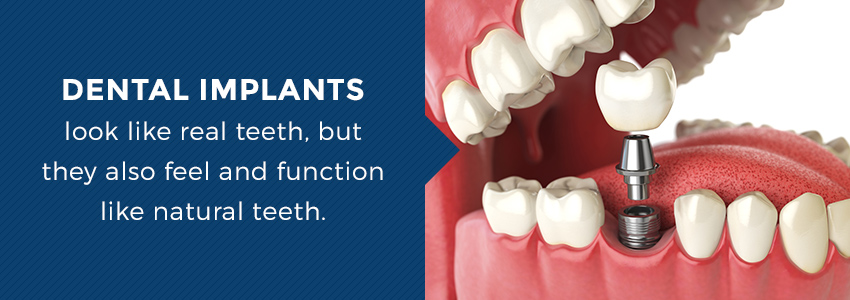
And not only does a dental implant look like a real tooth, but it also feels and functions like natural teeth. You’re able to clean a dental implant with a toothbrush and toothpaste — just like you would your natural teeth. It’s also the best choice for replacing missing or damaged teeth.
You need sufficient underlying bone strength to support the implant when considering this dental option. If your bone is too soft and can’t support the implant, your dental clinician will need to use a bone graft. During this procedure, the implant dentist grafts a special grafting bone material into your jawbone.
You’ll have to wait two to three months for the bone graft to create a sufficient amount of strong new bone in your jaw to ensure it can support the final dental implant successfully.
Dental implant procedures typically involve a few steps:
If you’re missing a single tooth or multiple teeth, dental implants will help you get back your beautiful, natural-looking smile. Implants will:
Bone deterioration in your jaw and related tooth loss and can cause your face to slightly sink. Dental implants will help keep your facial structure and bone intact, taking away this sunken appearance and helping you feel and look your best.

When a dentist places implants, they don’t alter or damage any neighboring teeth. In fact, the implants help position and preserve the structure of your remaining teeth.
They also help maintain the beauty and brightness of your smile. Plus, they don’t make oral hygiene complex since they function like real teeth. You’ll brush, floss and continue the same oral care as you would with a complete set of natural teeth.
When an experienced dentist or oral implantologist places an implant, they function just like a real, natural tooth. They’re built to last a long time, making them a cost-effective, long-term solution. You don’t have to worry about the implant coming loose or falling out when you eat, talk or laugh.

Since the dentist surgically places the posts in your lower or upper jaw, they act like a sturdy anchor for your replacement tooth or teeth. They don’t embarrass you when you’re talking because they don’t affect your speech, unlike dentures that make you struggle to pronounce simple words.
Dental implants also assist in preventing the shrinkage of jawbones where your teeth are missing. Because of their attachment, they’re stable and secure, allowing you to chew and bite naturally.
Caring for dental implant-restored teeth, as mentioned earlier, is similar to caring for your natural teeth. You can:
Your dentist may also recommend certain cleaning aids to use at home to help keep your teeth healthy.
You’ll need to work closely with your dentist to ensure your implant lasts a long time. Even though you can’t get cavities in replacement teeth, they’re still subject to other forms of wear and tear. Yet when placed properly and well cared for, dental implants have the potential to last a lifetime.
For clinicians who are already using implants or are looking into providing this service to their patients, you may want to consider using implants constructed with bio-compatible titanium and titanium and ceramic abutments to provide your patients with better, high-quality oral products.
Implants are semi-permanent and will require adjustments periodically. However, keeping them in good condition will help preserve their lifespan.
While there’s a lower initial cost for dentures than implants, dentures incur additional costs later on. Since implants are semi-permanent, they’re less expensive over the long run because there are no reoccurring additional costs like with dentures.

Some dental implants might even cost less than other options for tooth replacement since implants tend to last longer when a skilled implant dentist places them. For instance, implants cost less long-term than a dental bridge since a bridge comes with high-maintenance fees. Implants, on the other hand, are customized for your mouth and require little maintenance.
As an experienced dental clinician, you know all patients are different — and so are their dental implant treatments. Therefore, the number of procedures and appointments will vary based on the patient, as will their treatment costs. As a patient, you know you’re paying a price based specifically on your situation.
Your dental clinician will design lower and upper-implant dentures to fit snugly in your mouth and function just like your natural teeth. With dentures, you can take them out for convenient maintenance and cleaning.
Dentures are a removable dental appliance you wear to replace missing teeth. Full or complete dentures will replace all your upper or lower teeth and jaw — or both. Partial dentures will help fill in gaps when you still have some natural teeth remaining.
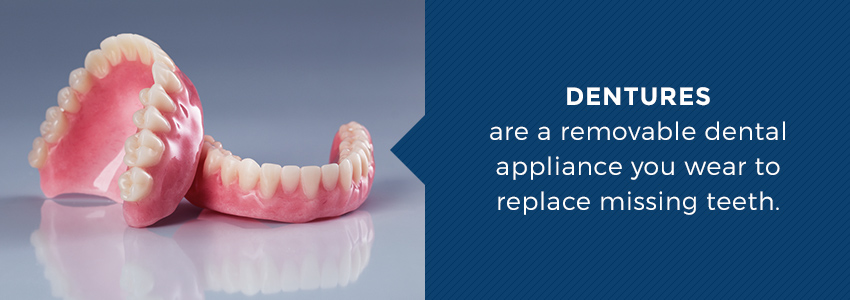
Precision-type attachments clasp around your existing teeth or fit over crowns to support your partial dentures. Complete dentures, however, rest directly on your gums. For extra support and strength, some dentures will also include a lightweight frame made of metal.
Dentures help fill out your profile and facial appearance. Yet your overall appearance doesn’t change much since dentures look like your natural teeth. They even improve your smile.
Types of dentures include:
When you start losing natural teeth, your facial muscles can sag, making you look older. Dentures make your face look fuller and younger. They resemble your natural teeth so much, chances are most people won’t even realize you’re wearing them. They may even improve the appearance of your smile.
An essential function of your teeth is chewing your food. Once you get dentures, to be able to accomplish this “chewing function,” they’ll be doing all the chewing now instead. Therefore, dentures need to:
When your dentures aren’t secured properly with adhesive, they can slip out of place when you’re speaking or eating. Not only this but your jawbone — which once fundamentally supported your teeth — starts to go as well. The result of this happening is the lower part of your face will collapse from within. Consequently, you’ll have more soft tissue and skin than you’ll have supportive hard tissue, resulting in sagging, folding and sunken tissue surrounding your mouth.
While removable teeth are as comfortable and functional as your natural, real teeth, it can affect your emotions since most individuals psychologically prefer their natural teeth.
Despite wearing full dentures, you’ll still need to continue practicing proper dental hygiene. This means brushing your tongue, cheeks, gums and roof of your mouth each morning using a toothbrush with soft bristles. Do this before inserting your dentures to help stimulate tissue circulation and remove plaque.
You’ll also need to eliminate all plaque and food particles from your dentures just like you would your natural teeth. When you brush your dentures, you’ll keep them from staining as well.
Before you brush your dentures to remove any loose food or debris, first rinse them off. Make sure you’re only using a soft-bristled brush since you don’t want to scratch the surfaces of your dentures.
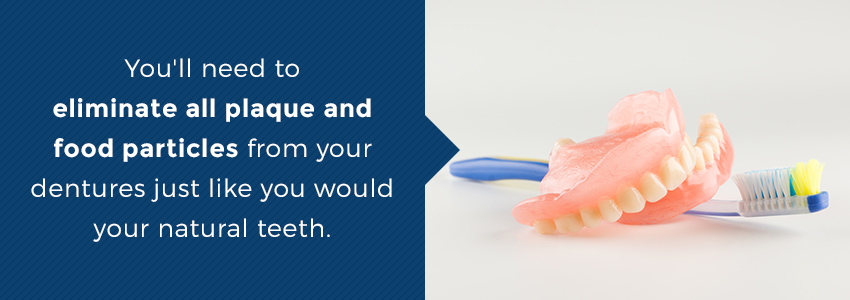
Make sure you clean your entire mouth to reduce the chances of bad breath and oral irritation. When you don’t have your dentures in, place them in water and store them in a safe place.
Dentures may require adhesives every so often. Adhesives can come in:
If you decide to use any of these adhesives, make sure to read the directions carefully and use them only as directed. Products with an ADA seal on them are good and considered the most effective and safest. Dentists may also recommend appropriate adhesives and cleansers.
You need to repair or replace your dentures typically every three to four years — through this range varies based on care and usage.
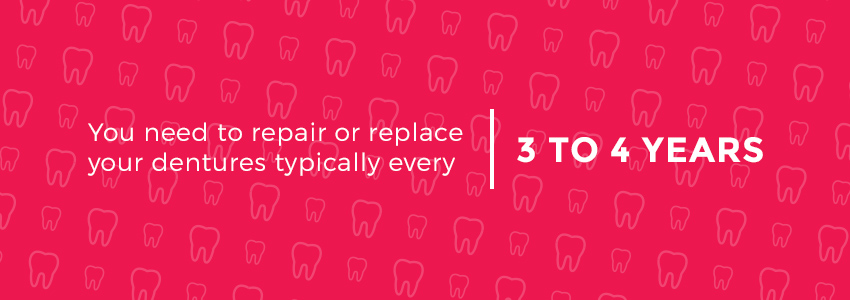
Over time, dentures need to be relined, rebased or replaced since your mouth changes as you age. With relining, your dentist fits the denture base to your gum line by adding new material to the underside. When they use the existing denture as a model to make the base, it’s rebasing. Gum ridges shrink and recede and your jaws might not line up the same as bones. Because of this, your dentist will need to remake your dentures to fit properly one again.
The cost of dentures can vary widely. However, the initial price you pay for them isn’t the “full” cost — it’s merely the up-front product price. The complete cost of your dentures can be much more than what you initially pay for them. since denture costs routinely don’t include:
Remeber, today’s cost for your dentures is just the beginning. The full cost of your dentures will continue for years — both financially and emotionally.
Your teeth restoration options include dental implants and dentures, but it takes several factors to determine what’s the better choice between the two for your situation.
If wearing dentures for this point in your life makes you cringe, you’ll likely be happy to know there’s another safe and effective alternative — dental implants.
These days, more individuals are picking implants over dentures to restore their smile. Dental implants have more benefits than just their cosmetic appeal, including:
Let’s compare the two:
Dentures might appear as the more affordable tooth-replacement option. But remember, after adding up the other costs of cleaning solutions, fixatives and denture replacements, your total price will increase.
And, considering you have to replace dentures every three to four years while dental implants can last a lifetime if properly placed and cared for, it’s not surprising so many individuals consider implants a long-term investment.
For individuals looking for a more permanent, fixed answer comparable to natural teeth, implants are certainly well worth that investment. Dentures simply aren’t able to match the confidence, peace of mind and comfort dental implants provide.
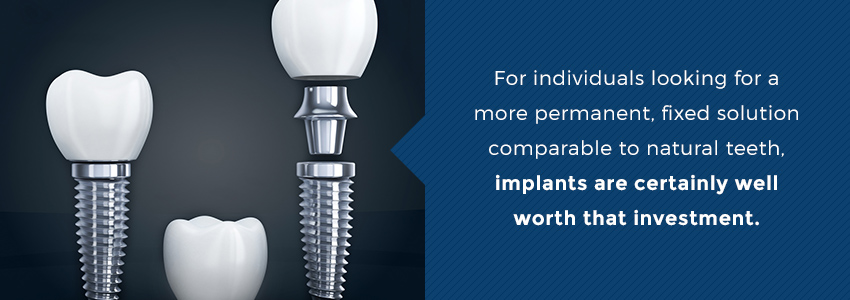
Precise technology, innovative treatments and experienced dental clinicians all make dental implants the more feasible choice. Not to mention many dental offices offer financing options for qualifying patients.
You need to meticulously clean your dentures every day. Implants you simply brush and floss to maintain.
Food might taste better with implants. You can chew your food properly with implants and you also have a greater variety of foods you can eat. Plus, if you’re replacing upper dentures with implants, you’re leaving your upper palate uncovered, which has most of your taste buds.
Implants are durable and can last many years if properly cared for. Dentures will require inevitable and regular replacement.
From a performance and comfort standpoint, dental implants are much better than dentures. Removable dentures run the risk of slipping and moving while you speak or eat, causing discomfort and — in some cases — embarrassment.
When dentures don’t fit well, they irritate your gums and can lead to sores in your mouth. You also have to take maintenance into consideration. Trying to secure your dentures with adhesive paste can be tricky, not to mention makes cleaning more of a chore.

Dental implants inherently function and feel more like real teeth. You clean and take care of them as you would real teeth. You may speak without worry or fear, eat the foods you want and go about your day without worrying about your teeth coming loose or falling out. Dental implants provide you with a level of freedom and confidence you don’t get when wearing dentures.
Implants help keep your surrounding real teeth from moving out of position, and the dentist won’t need to modify the teeth. Often, dentists need to grind down or modify neighboring teeth
with partial dentures.
Perhaps the most substantial advantage of implants over dentures is they can help preserve your jawbone, preventing jawbone shrinkage. This maintains the integrity of your facial structure and keeps you appearing healthier.
Let’s take a look at more specific pros and cons of dental implants vs. dentures.
Some advantages of dentures include:
If a section of your mouth is missing teeth, implants are a way to add a root structure as well as a tooth to your jawbone.
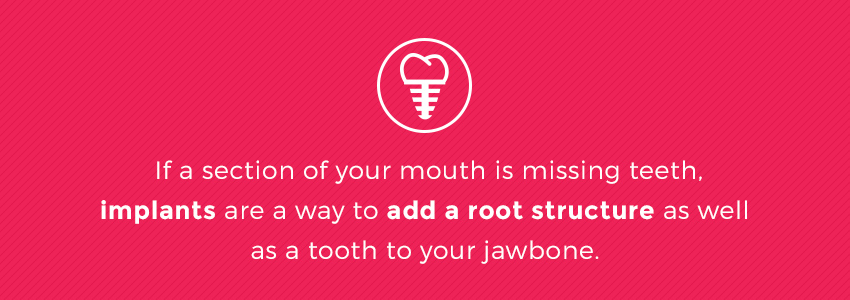
Some benefits of selecting implants include:
Dental implants are the superior option for teeth replacement because they’re permanent. They also improve quality of life related to oral health when compared with other treatments, according to a study.
If you’re a clinician, contact us for more information on our dental implants and other products. You can also use our zip-code tool to locate a representative in your area. If you’re a patient who is eager to learn more and get started with their dental implants can contact your dental professional.